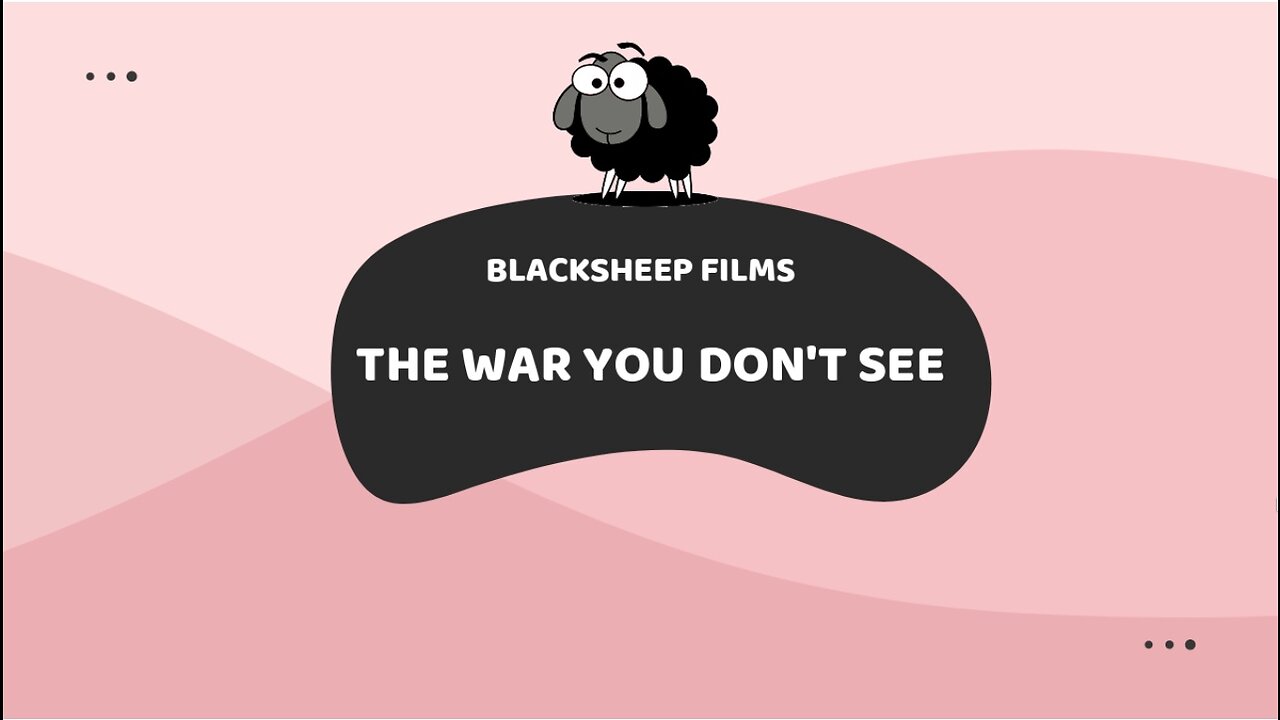Premium Only Content

The War You Don’t See
En La guerra que no ves, John Pilger vuelve al tema de los reportajes de guerra y su papel fundamental en la realización de las guerras. Este 'ritmo de tambor' fue el tema del documental de Pilger de 1983 Frontline: The Search for Truth in Wartime, una historia del periodismo de guerra desde Crimea en el siglo XIX ('la última guerra británica sin censura') hasta la Guerra de las Malvinas de Margaret Thatcher en 1982. .
La guerra que no ves analiza la propaganda como arma en Irak y Afganistán. El título se refiere a la censura por omisión – 'la forma más virulenta de censura,' dijo Pilger – y la colusión de periodistas en sociedades nominalmente libres como Gran Bretaña y Estados Unidos.
La película comienza con imágenes impactantes de Irak en 2007. Un helicóptero de combate Apache estadounidense abre fuego en una calle de Bagdad, matando a sangre fría a dos periodistas de Reuters, junto con civiles iraquíes. No hay provocación, las víctimas están desarmadas. Uno de los tripulantes de Apache comenta 'Agradable' mientras asesina personas a una distancia segura. Titulado 'Asesinato colateral', el video fue filtrado a WikiLeaks por el soldado Bradley (luego Chelsea) Manning.
'Vender' la invasión de Irak en 2003 es la pieza central de la película de Pilger. Los medios de comunicación son expuestos como una fuente de ilusiones, como un vínculo inexistente entre Saddam Hussein y los ataques del 11 de septiembre. Un testigo de la CIA dice que el objetivo principal de la inteligencia proporcionada por el Pentágono es manipular la opinión pública.
En una serie de notables entrevistas, destacados periodistas de Gran Bretaña y Estados Unidos coinciden en que, si ellos y sus colegas hubieran desafiado en lugar de amplificado y hecho eco de los engaños de sus gobiernos, la invasión de Irak podría no haberse producido.
El ex presentador de noticias de CBS, Dan Rather, le dice a Pilger que las "preguntas duras, incisivas y agresivas" podrían haber evitado la guerra, mientras que Rageh Omaar, el hombre de la BBC en Irak, dice: "No pudimos presionar los botones más incómodos lo suficiente", y el reportero David Rose, que hizo campaña en The Observer a favor de la invasión, se refiere al "paquete de mentiras que me ha proporcionado una campaña de desinformación bastante sofisticada" y está de acuerdo en que los periodistas son culpables de crímenes de guerra.
Perspectivas como estas, provenientes de una industria notoriamente defensiva, son raras, como lo es la aparición del editor en jefe de ITV News y el jefe de recopilación de noticias de la BBC, quienes defienden un sesgo institucional, no del todo convincente.
Imágenes no proyectadas anteriormente muestran un ataque de 2004 contra la ciudad iraquí de Faluya por parte de fuerzas estadounidenses y británicas que dejó miles de muertos. El informe de un periodista estadounidense independiente y las fotografías de las fosas comunes nunca aparecieron en los principales medios de comunicación. En la Palestina ocupada, informa Pilger, rara vez se informa sobre la intimidación y el asesinato de periodistas no occidentales por parte de los israelíes.
La guerra que no ves marca el surgimiento de WikiLeaks, cuyo fundador y editor en jefe, Julian Assange, le dice a Pilger que su organización brinda a los 'objetores de conciencia' dentro de los 'sistemas de poder' un medio para informar al público directamente, un hito en periodismo
"Las vidas de innumerables hombres, mujeres y niños dependen de la verdad", concluye Pilger, "o su sangre está sobre aquellos de nosotros que estamos destinados a mantener las cosas claras".
The War You Don’t See analyses propaganda as a weapon in Iraq and Afghanistan. The title refers to censorship by omission – ‘the most virulent form of censorship,’ said Pilger – and the collusion of journalists in nominally free societies such as Britain and the United States.
The film begins with shocking footage from Iraq in 2007. An American Apache gunship opens fire on a Baghdad street, killing in cold blood two Reuter journalists, along with Iraqi civilians. There is no provocation – the victims are unarmed. One of the Apache crew comments ‘Nice’ as he murders people at a safe distance. Titled ‘Collateral Murder’, the video was leaked to WikiLeaks by soldier Bradley (later Chelsea) Manning.
‘Selling’ the 2003 invasion of Iraq is the centrepiece of Pilger's film. The news media is exposed as a source of illusions, such as a non-existent link between Saddam Hussein and the attacks of 9/11. A CIA witness says the primary aim of intelligence supplied by the Pentagon is to manipulate public opinion.
In a series of remarkable interviews, prominent journalists in Britain and the United agree that, had they and their colleagues challenged rather than amplified and echoed the deceptions of their governments, the invasion of Iraq might not have happened.
Former CBS newscaster Dan Rather tells Pilger that ‘tough, digging, aggressive questions’ might have prevented the war, while Rageh Omaar, the BBC's man in Iraq, says, 'We failed to press the most uncomfortable buttons hard enough,’ and reporter David Rose – who campaigned in The Observer for the invasion – refers to ‘the pack of lies fed to me by a fairly sophisticated disinformation campaign’ and agrees that journalists are guilty of war crimes.
Perspectives such as these, coming from a notoriously defensive industry, are rare – as is the appearance of the editor-in-chief of ITV News and the BBC’s head of newsgathering, who defend an institutional bias, not altogether convincingly.
Previously unscreened footage shows a 2004 attack on the Iraqi city of Fallujah by American and British forces that left thousands dead. An independent American journalist’s report and photographs of mass graves never appeared in mainstream media. In occupied Palestine, reports Pilger, the intimidation and killing of non-Western journalists by the Israelis are seldom reported.
The War You Don't See marks the rise of WikiLeaks, whose founder and editor-in-chief, Julian Assange, tells Pilger that his organisation gives ‘conscientious objectors’ within ‘power systems’ a means of informing the public directly, a landmark in journalism.
‘The lives of countless men, women and children depend on the truth,’ concludes Pilger, ‘or their blood is on those of us who are meant to keep the record straight.’
Blacksheep Twitter: https://twitter.com/Blacksh49424801
-
 24:33
24:33
Blacksheep
8 months agoa controversial statement
9703 -
 39:56
39:56
BonginoReport
2 hours agoTrump Alpha-Males Colombia (Ep.126) - 01/27/2025
18.9K48 -
 LIVE
LIVE
Jeff Ahern
1 hour agoMonday Madness with Jeff Ahern (6am Pacific)
581 watching -
 1:21:30
1:21:30
Game On!
10 hours ago $1.26 earnedPatrick Mahomes does it AGAIN!
7.83K2 -
 15:20
15:20
Misha Petrov
2 hours agoReacting To Liberal MELTDOWNS Over Trump’s Return - Gen Z Is Planning a REVOLUTION?!
14.3K12 -
 18:22
18:22
Neil McCoy-Ward
2 hours agoThe 🇨🇴 Colombian President Just Learned The HARD WAY!!! (Another Win For The USA 🇺🇸)
13.3K8 -
 1:56:04
1:56:04
TheDozenPodcast
17 hours agoMass deportations, Islamists, Saving the UK: Nick Tenconi
25K18 -
 35:24
35:24
Survive History
22 hours ago $9.10 earnedCould You Survive in a Cavalry Regiment During the English Civil War?
90.6K9 -
 28:15
28:15
Degenerate Plays
17 hours ago $4.48 earnedTwo Birds' Secret Meeting - Gotham Knights : Part 26
73.1K6 -
 12:29
12:29
Mr. Build It
5 days agoWish I Knew This Before I Started Building It
69.1K25